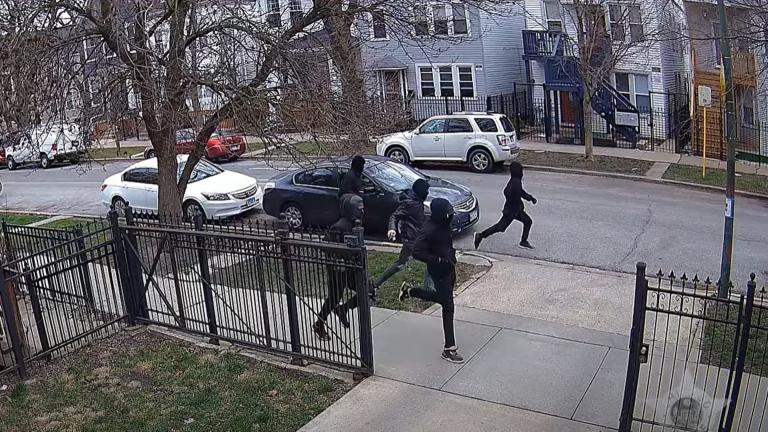 Demonstrators march in Chicago on Wednesday, June 24, 2020 to show their support for removing police officers from schools. (WTTW News)
Demonstrators march in Chicago on Wednesday, June 24, 2020 to show their support for removing police officers from schools. (WTTW News)
Approximately 72% of all search warrants served by the Chicago Police Department in homes during the past four years targeted Black men, according to a report from the city’s watchdog released Thursday.
Inspector General Joseph Ferguson has been investigating raids conducted by the Chicago Police Department at the wrong address since November 2019, and the report marks the second time his office released preliminary results of the probe.
Just 3.5% of the approximately 5,500 residential search warrants served by Chicago police officers between 2017 and 2020 targeted white Chicagoans, according to the report from the inspector general’s office. A decline in the number of search warrants served by the Chicago Police Department began in 2019 and continued through 2020 during the COVID-19 pandemic, according to the report.
Black men were 4.6 times more likely than Latino men to be the subject of search warrants served by the Chicago Police Department, and 25.3 times more likely than white men, according to the report.
The city’s population is approximately one-third White, one-third Black and one-third Latino, according to census figures.
In addition, the majority of search warrants were served on the city’s South and West sides, with raids concentrated in Englewood and Humboldt Park, according to Chicago Police Department data reviewed by the city’s inspector general.
Approximately 73% of all warrants sought illegal drugs, with 24% seeking illegal guns, according to the report.
The inspector general’s report was highly critical of the way the Chicago Police Department tracks data about raids authorized by search warrants. Those warrants often include incomplete information about the location to be searched as well as the people sought, according to the report.
Nearly a quarter of all search warrants did not include an apartment number, even though the warrant authorized the search of an apartment, according to the report.
In addition, the department does not record whether children were present during the raids or whether the officers were permitted to enter the location without knocking, according to the report.
The report also found that Chicago Police Superintendent David Brown overstated the success rate of search warrants during a December hearing held by the City Council’s Public Safety Committee, and that poor record-keeping by the department means it is impossible to gauge whether the warrants obtained the evidence sought, according to the report.
Brown told aldermen that nearly 90% of all warrants were successful.
While 88% of all search warrants resulted in the recovery of some type of property, 59% resulted in an arrest, according to data reviewed by the inspector general’s office.
“The rate of gainful warrants alone cannot be taken as a rate of success, however, because it is essentially reflective of how often property is recovered; this may indicate not only the recovery of the contraband or evidence that is identified in the warrant, but also the recovery of any other property, such as documents to establish proof of residency,” according to the report. “Additionally, this measure does not consider whether the raid resulted in the recovery of the evidence for which the warrant was obtained, and, therefore, may not directly reflect a high accuracy rate in the information used to obtain warrants.”
Data from the police department shows warrants that sought drugs were successful 75% of the time, and those that sought guns were successful 40% of the time, according to the report. However, the police department often recovered drugs and guns during raids that were not designed to recover those items, according to the report.
It is unusual, if not unprecedented, for the city’s watchdog to release a second interim report during an ongoing probe.
It was prompted by Ferguson’s desire to shape ongoing efforts by both the Chicago Police Department and the Chicago City Council to revamp the way the police department uses search warrants in the wake of the firestorm triggered by video of a mistaken raid that left Anjanette Young handcuffed and pleading for help in February 2019.
“[The Chicago Police Department] and members of the community are best served by a well-informed and productive reform process, and we hope to contribute to that process by providing accessible data as a platform for effective policy change,” said Deputy Inspector General for Public Safety Deborah Witzburg.
Mayor Lori Lightfoot has been highly critical of Ferguson’s search warrant probe, saying it has taken too long.
In January, Ferguson urged the department to “modify its directive on search warrants to require verification and corroboration of information in all circumstances and broaden the circumstances in which supervisors must initiate an investigation to determine whether discipline is necessary and appropriate when a search warrant is erroneous in fact or execution.”
Police officials agreed with those recommendations, and they were reflected in the revised policy for search warrants introduced by Lightfoot in March. However, those changes have yet to be implemented, and Attorney General Kwame Raoul said the proposal was insufficient.
At the same time, Lightfoot has opposed a measure backed by Young and several aldermen, including five Black female members of the City Council, to ban no-knock warrants and require officers to use “tactics that are the least intrusive to people’s home, property and person and least harmful to people’s physical and emotional health,” while tracking warrants.
The City Council has yet to consider that proposal.
Contact Heather Cherone: @HeatherCherone | (773) 569-1863 | [email protected]








